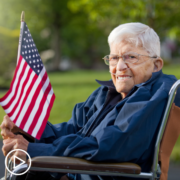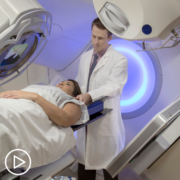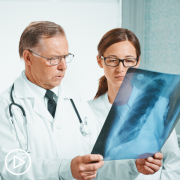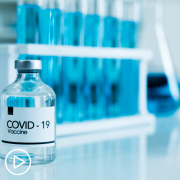Lung Cancer Care for Veterans: Advancements in Radiation Oncology
Lung Cancer Care for Veterans: Advancements in Radiation Oncology from Patient Empowerment Network on Vimeo.
What should veterans with lung cancer know about radiation oncology advancements? Expert Dr. Drew Moghanaki from UCLA Health explains recent advancements in radiation oncology and radiotherapy, where the advanced therapies are accessible, and proactive patient advice.
[ACT]IVATION TIP
“…make sure you do your homework and try to make sure that the department of radiation oncology you’re going to really does have the best technologies. And there’s lots of different ways to look at this, including going online and reading more about what the quality of care might be in the community.”
Download Resource Guide | Descargar guía de recursos
See More from [ACT]IVATED NSCLC Veterans
Related Resources:

Combating Disparities: Veterans’ Healthcare Access and Quality |

|

Advancements in Lung Cancer Clinical Trials Updates for Veterans |
Transcript:
Lisa Hatfield:
Dr. Moghanaki, are there any promising advancements or techniques in radiation oncology that could potentially improve outcomes for veterans with lung cancer?
Dr. Drew Moghanaki:
Yeah, there really are. So back in the old days, radiotherapy was just an open beam that we would shine towards a general area of the body. And they did a good job of getting control of the cancer, but, unfortunately, it would injure a lot of normal tissues. Today, radiotherapy is much more precise and targeted. In fact, our precision is within less than a millimeter of what we aim at. And so military analogy is this is like your best sharpshooter that can hit a small, less than a one-inch target from a 1,000 yards away.That’s basically what we’re able to do. We’re not a 1,000 yards away. The machine’s right there. We can see inside the human body. We can see the tumor, especially if it’s moving, and we can deliver highly concentrated high dose X-rays specifically to the tumor with a very little amount of exposure to the area around it.
So we’re just not seeing our patients getting injured from radiotherapy, and we’re seeing sometimes some situations up to 100 percent complete tumor control with no further growth. So it’s really important for veterans to know. So my activation tip is if surgery is on the table, you might want to check in with a radiation oncology team as well to see, well, is radiotherapy an option as an alternative? It might be safer and just as good and maybe better. So a lot of people don’t know about this because this is not taught as much, but radiotherapy is really one of the major forms of curative therapy for lung cancer.
Lisa Hatfield:
Okay, thank you. As a patient, I always have follow-up questions to clarify a couple of things. So I have another follow-up question to this, the question you just answered. So I know that not all veterans are seen at VA hospitals or VA facilities. If they are being seen at a VA facility, will they have access to the latest and greatest radiation radiotherapy services, or do only some centers have these special types of therapies?
Dr. Drew Moghanaki:
Yeah, well, when it comes to the VA’s commitment to provide the best care for every single veteran who’s eligible, there’s a logistical challenge in that it’s hard to deliver care to veterans everywhere, especially super sub-specialty care like thoracic surgery or radiation therapy. The equipment’s expensive. There’s a lot of staff that has to be hired. You can just look at airports. We don’t have a major commercial airport in every town and city in the U.S. They’re in major towns, major cities.
And that’s kind of how things are with the VA medical centers. And even when you look at the network of 130 VA medical centers in the 50 states of the U.S. only just more than 40 of them actually have radiotherapy on site at that VA medical center. So a lot of veterans who actually need radiation therapy are going to be getting that through the VA referred out to the community providers.
And so it’s important to if you’re at the VA, you’re very likely to get high-quality radiation therapy because a lot of oversight, the federal government’s watching. In fact, it’s the most regulated radiation oncology service in this country at this time. But if you’re going out into the community, make sure you do your homework. And my activation tip would be then make sure you do your homework and try to make sure that the department of radiation oncology you’re going to really does have the best technologies. And there’s lots of different ways to look at this, including going online and reading more about what the quality of care might be in the community.
Share Your Feedback
Create your own user feedback survey










